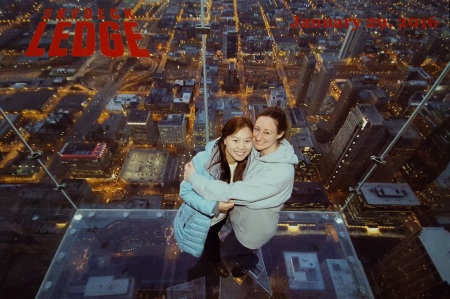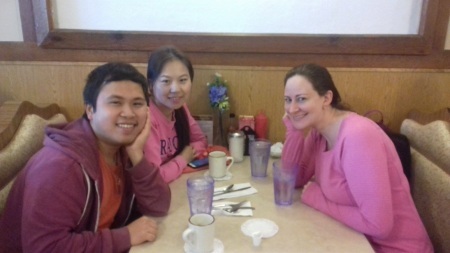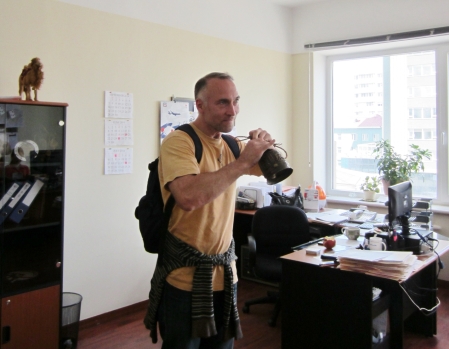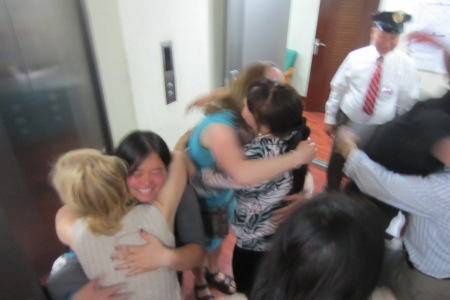Tsagaan Sar (meaning both white month and white moon) is Mongolia’s most revered holiday. It coincides with what Americans might refer to as Chinese New Year, though the Mongolians I mentioned that to didn’t like it one bit, and rightfully so, I think. Since they are celebrated completely differently, Mongolians should get the recognition of their own holiday for the Lunar New Year, which is a big deal here. I am the Year of the Dragon, as are my host mom and dad (they are 12 years older), which is why I wanted my new deel to have dragons. 🙂

A not-great picture of an amazing fabric.
Whereas Naadam is all fun and games, Tsagaan Sar is full of tradition and custom. The American equivalent to Tsagaan Sar would be if you took the food of Thanksgiving (not the actual food, of course, but that food is the centerpiece), the gift giving of Christmas (according to the Mongolian rules of gift giving), the fanciness of a formal New Year’s Eve gala (not that I ever attended one), combined the expense of those three holidays, and threw in some serious spring cleaning.
During the week or two prior to Tsagaan Sar, Mongolians spend hours upon hours cleaning their homes in preparation for visits from family and friends. They go shopping for gifts to give those who come to their home. They prepare bite-sized, meat-filled dumplings (bansh, buuz) by the thousands to feed those who come to their home. Little work-work happens during this time, especially that week prior to Tsagaan Sar.
This year, I was able to help two friends with their bansh making. In both instances, all the preparation (rolling out the dough, filling the dough with meat, pinching it closed) took place on the floor. Very curious to me, given that this is such a musical culture, was that there was no music. I think of painting parties or such back home and there’s often music to occupy our minds while we do the task at hand. But here, in each home, the tv was on as background noise but what was on didn’t seem to matter. For all intents and purposes, bansh making was a very quiet affair.

Assembly line at first home. I stuffed a full bowl of meat’s worth of bansh.

Bansh, sitting on the car to freeze.

They had a more fancy pinching technique to make flower-shaped bansh.

1. stuff 2. pinch 3. place
The first morning of Tsagaan Sar some families watch the sunrise and circle the ovoo 3 times and give a milk offering. I was invited by Oyuna, one of my medical college ladies, to join her and her husband, who is one of my students at the vocational school. This time of year, in this part of the country, sunrise is about 9am. Unfortunately, the morning of Tsagaan Sar was overcast and cloudy, but at around the time of the sunrise, people around me raised their hands toward the sun. (It was the closest thing to religion I’ve seen here, apart from visiting a monastery during PST.) During the wait for the sun to rise, I’d entertained fantasies of returning home and taking a nap, since the first day of Tsagaan Sar is family day. At this point, I didn’t know that wasn’t going to happen.

I could say they kidnapped me for the day. But, I prefer to think of it as adoption-for-a-day.

Hands raised toward the sun.
Now, I’ve just explained that Tsagaan Sar is a time to visit families, but I’m going to spell this out for you because I didn’t fully understand what that meant until I was a part of it. I went with Oyuna and her husband to Oyuna’s oldest family member’s home, then to Oyuna’s home. I was starting to question whether I should stay, or rather, whether I was supposed to go (being very aware of my gadaad hun (outside person) status, I wasn’t sure if my still being there was appropriate). So I asked and Oyuna said that I should stay with them because otherwise I would be alone and I shouldn’t be alone. I didn’t have a problem with being alone, but neither did I have a problem with accompanying her and experiencing Tsagaan Sar to the fullest.
So, here was my revelation: IT WAS THE SAME PEOPLE. I visited 4 apartments and 5 or so gers before I lost count. Oyuna later told me it was 13 homes altogether. You know how, in America, individuals host the big holiday and everyone gathers in that home, probably relieved that they could skip hosting this year? Yeah, that is not Tsagaan Sar. At Oyuna’s, the second stop, I recognized some people, either the people themselves or their fancy deels or hats, and dismissed it thinking, “well, of course they’d be here, they’re family.” But at the 3rd, 4th, and 5th homes, I finally understood. Everyone hosts everyone. It’s a wacky idea that they each take very seriously.
That morning, at the first home wearing our deels and hats, getting in a line from oldest to youngest, we did the formal greeting (zolgokh). This was done only once, and later in the day as newcomers (who’d been visiting spouse’s families?) arrived. But everything else was repeated at each home: the milk-tea, the plate of ham and pickles, the host presenting the tower of bread and candy or aruul and saying “eat, eat” (well, the Mongolian equivalent which sounds exactly the same!), the formal presenting of the snuff bottles, the bansh, the vodka, the gifts (10 hours later, I had 20,000 worth of crisp tugs, an assortment of chocolates, and a shampoo/conditioner set). By my estimate, I ate between 30-40 bansh that first day—nowhere near the PCV record of 130—and I was super proud of myself at this assimilation even as I longed to go home and floss.

Zolgokh. Elder’s arms above, younger’s below. Each says a specific phrase. Sniff or kiss, first to the left, then to the right.

Towers on the left, fat on the right. Towers are always an odd number of layers. I occupied my time by counting them.

Exchanging the snuff bottles (filled with a powdered tobacco). Very ritualized but some people are more casual than others.

Self-serve bansh. By the end of Tsagaan Sar, I was eating these even when no one was watching (which is probably not true… someone was watching).
As Tsagaan Sar lasts 3 days officially, this scene played out a handful more times over the next two days, with me visiting a few friend’s and a few student’s homes. I’ve written 1000 words already, and included pictures, yet I feel I can’t really capture “what it was like” for you. During this time, and having little to do with how the Mongolians treated me, my emotions ran an intense gamut, including: being in awe (faced with the deep-seated tradition that I always found lacking in America), impatient (when will she call to invite me?), annoyed (at the short notice, “please come now”), overconfident (look at my shiny new deel!, as if that’s all it takes to fit in), shy (the only way I can reason not having taken advantage of this opportunity to speak Mongolian), frustrated (that I couldn’t be in control of my own food, especially the intake, “eat!”), incredulous (the snuff bottles, again? You just did that!), jaded (another sheep carcass on the table), exhausted. Was I a guest? An intruder? Is it possible to be at once ignored and the center of attention? Did I just sum up life as a PCV?
Last year, my M22 site-mate, Brittany, observed that, with a 27-month commitment, Peace Corps service gives you “a first time and a last time” to experience most of the holidays. As overwhelmed as I was, it is a bittersweet thought that I will not be here for the next Tsagaan Sar. Happy Year of the Horse!

Because I can’t have enough pics of smiling Mongolians.





 Posted by eelevol
Posted by eelevol 















